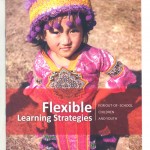At the global level, there is no commonly accepted terminology to encompass the various programmes that try to meet the learning needs of children outside of the formal schooling system. To this end, the term flexible learning strategies is used to cover the various initiatives and the different terminologies they are called including equivalence programmes, certified non-formal education (NFE) programmes, accelerated learning programmes, second chance education, community-based education/school/learning programmes, etc.
The regular education system with its traditional schools do not provide sufficient and appropriate learning options for children who do not enroll in school, or drop out early for a wide variety of complex and often interlinked reasons. Traditional schooling therefore is not adequate to achieve the Millennium Development Goal (MDG) 2 and Education for All (EFA) Goal 2 of universal primary education.
Substantial progress has been achieved in getting more children into school in Asia-Pacific. The adjusted net enrolment rate in primary education in Central Asia has reached 94.7 per cent, 96.9 per cent in East Asia and the Pacific, and 92.9 per cent in South and West Asia as of 2011.
However, there are still 18 million primary school age children who are not in school. Country studies undertaken as part of the Global Initiative on Out-of-School Children led by UNICEF and UNESCO Institute of Statistics also indicate that the estimates for out of school children could be higher.
In the region, progress towards universal enrolment has also slowed while many children drop out of school before completing the full primary cycle. Removing or lowering costs associated with education in order to ensure accessibility, relevance, inclusiveness and affordability has also proven to be not sufficient. Deep-rooted inequalities associated with gender, ethnicity, wealth and location in addition to poor quality education, are major barriers to getting more children into school.


